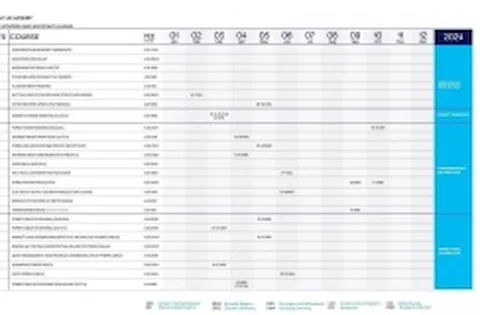CIM training course (online)
This training course will provide an understanding of how the IEC Common Information Model (CIM) standard supports digitalization in operations, planning, asset management and energy markets along with the IEC CIM modelling concepts to allow exchange of data.
The objective of grid digitalization is to create substantial value in cost and resource savings, higher data trusted analysis, as well as accelerating the green transformation of energy systems. Creating a single source of truth for the network model planning and operation allows for collaboration, modelling and streamlining of dataflows. It also makes it easy to apply business intelligence to capture more insight in the terms of asset management, investment planning and asset lifecycle processes.
The Common Information Model (CIM) is defined by the International Electrotechnical Commission (IEC) in the standards IEC 61970, IEC 61968 and IEC 62325. It is based on the Unified Modelling Language (UML) and split into three layers: canonical model, profiles and profile schemas. The introduction training covers the fundamentals of CIM an its use cases, while the advanced training goes deeper into the canonical model, CIM profiling and extensions.
Your benefits
The introduction CIM training will enable you to:
- Explain what is IEC CIM is, its way of working and how the existing standards, packages, classes and attributes fit together.
- Explain why and how CIM is a key driver of improvement in grid operations, planning and asset management
- Describe the use of CIM IEC 61968, IEC 61970 and IEC 62325
- Describe the importance of validation and conformance testing
- Explain how CIM fits into broader issues of data security, quality and assurance
- Provide an insight on real-life challenges in implementing CIM
For this basic CIM training it is beneficial if you would have access to the Enterprise Architect tool (to be able to load CIM 100.eap file and browse through).
The advanced CIM training will focus on:
- Understanding the various parts of the CIM canonical model, the most common classes and their relationships
- Learning how to create a CIM profile from scratch or modify an existing profile
- Learning how to extend the CIM canonical model
- Generating schemes and documentation for your CIM profiles
For this advanced CIM training it is beneficial if you would have:
- access to the Enterprise Architect tool (to be able to load CIM 100.eap file and browse through)
- CimConteXtor and CimSyntaxGen installed (link)
- 2 screens (very beneficial)
Who should attend?
- An organization that has already decided it needs to implement CIM as a their standard metadata for network model management or wishes to know more about what CIM would mean for them;
- Managers, data owners, data architects, enterprise architects and interface developers of power utilities who need up-to-date knowledge of CIM.
On request, Energy Academy can also provide an in-company training course in English (content, location and duration of the course can be adapted to the client's wishes). Please contact us for more information.


